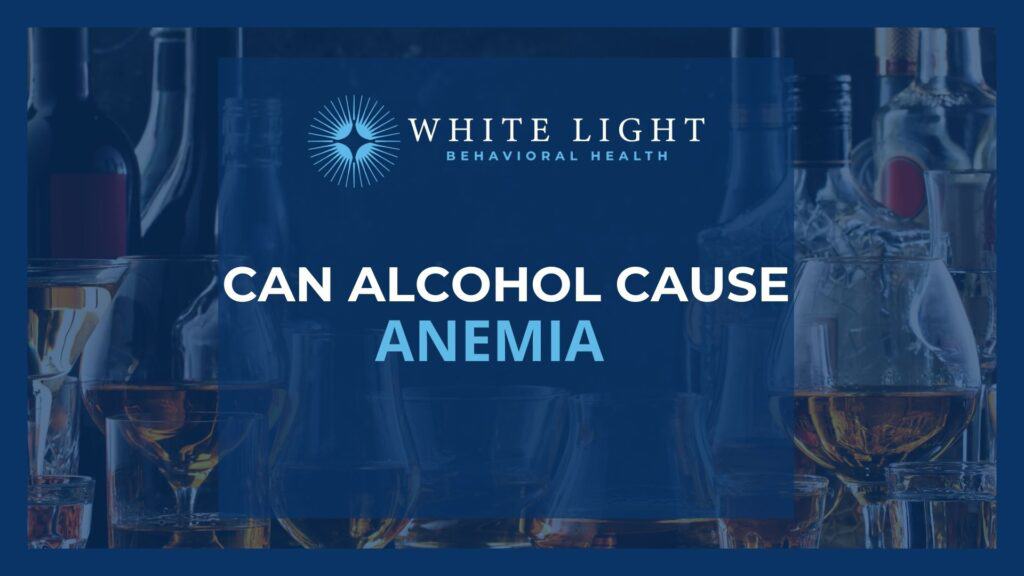Alcohol’s Hidden Consequences on Causing Anemia
Alcohol is a psychoactive drink that can have short-term and long-term effects on the body and mind. While moderate alcohol consumption may be enjoyed responsibly by many individuals, alcohol abuse involves the misuse or excessive intake of alcohol, leading to a range of negative consequences.
Alcohol abuse is a severe and widespread problem affecting individuals and communities worldwide. It refers to the excessive and problematic consumption of alcoholic beverages, which negatively affects physical health, mental well-being, relationships, and overall functioning. Alcohol abuse goes beyond occasional or social drinking and involves a pattern of harmful behaviors and adverse outcomes.
Alcohol Abuse Signs and Symptoms
Alcohol abuse is a serious health concern that can harm one’s physical and mental well-being. Therefore, identifying the signs and symptoms of alcohol abuse is crucial for early intervention and seeking appropriate help. Some common signs and behaviors that may indicate alcohol abuse include:
- Increased tolerance: The need to drink more amounts of alcohol to achieve the desired effect or experience reduced effects with the same amount
- Withdrawal symptoms: Experiencing physical or psychological symptoms when attempting to stop or reduce alcohol consumption. These symptoms may include sweating, tremors, anxiety, irritability, nausea, or insomnia.
- Drinking in larger quantities or for longer periods: Consistently consuming more alcohol than initially planned or continuing to drink despite negative consequences.
- Failed attempts to quit or cut back: Repeatedly trying to reduce or stop alcohol consumption without success
- Neglecting responsibilities and obligations: Prioritizing drinking over work, school, or personal commitments leads to declining performance or neglecting important tasks.
- Social or interpersonal problems: Alcohol abuse can lead to strained relationships with family, friends, and colleagues due to behavior changes while under the influence or due to alcohol-related incidents.
- Risky behaviors: Engaging in dangerous activities such as drunk driving, unprotected drunk sex, or getting into fights while intoxicated.
- Continued alcohol use despite negative consequences: Despite experiencing physical health issues, legal problems, financial difficulties, or other negative effects due to alcohol abuse, you continue to drink.
- Neglecting hobbies and activities: Losing interest in activities once enjoyed in favor of drinking alcohol
- Secrecy and hiding alcohol use: Going to great lengths to hide alcohol consumption from others, such as hiding bottles or sneaking drinks
- Preoccupation with alcohol: Constantly thinking about alcohol, planning when and where to drink, or feeling a strong urge or craving to drink
Symptoms of Alcohol-Related Anemia
Alcohol consumption significantly affects human health, including nutrient deficiencies, bone marrow function, and gastrointestinal health. These factors can all contribute to anemia, a condition characterized by decreased red blood cells or hemoglobin in the blood due to excessive alcohol consumption as per a study of Ballard HS published in the National Library of Medicine. Alcohol-related anemia often manifests with symptoms similar to other forms of anemia, which include:
- Fatigue and weakness: Feeling tired or weak even after adequate rest is a common symptom of anemia. It occurs due to a decreased oxygen-carrying capacity of the blood.
- Pale skin and mucous membranes: Anemia cuts down the number of red blood cells, resulting in paleness of skin, lips, and lower eyelids.
- Shortness of breath: Insufficient red blood cells or hemoglobin can decrease oxygen supply to the tissues, causing breathlessness, especially during physical exertion.
- Rapid or irregular heartbeat: Anemia stresses the cardiovascular system, leading to a rapid or irregular heartbeat.
How Does Alcohol Abuse Cause Anemia?
Alcohol abuse can cause anemia through various mechanisms, which include:
Nutrient Deficiencies
Excessive alcohol consumption can lead to nutrient deficiencies, impairing the production of healthy red blood cells and contributing to anemia. Alcohol prevents absorbing and utilizing essential vitamins and minerals in red blood cell formation. Notably, alcohol disrupts the absorption of B vitamins (especially folate), C, D, iron, and zinc.
Folate, a B vitamin essential for red blood cell synthesis, is particularly affected by alcohol. Alcohol impairs folate absorption, reduces folate levels in the body, and inhibits its activation. Folate deficiency can result in megaloblastic anemia, where red blood cells are larger and fewer in number.
Iron is vital for forming hemoglobin, the protein that transmits oxygen in red blood cells. Alcohol impairs iron absorption from the diet and promotes iron deficiency anemia. Alcohol-induced liver damage can also disrupt iron metabolism, further exacerbating the risk of anemia.
Zinc and vitamin C are crucial for adequately functioning red blood cell synthesis enzymes. Alcohol impairs the absorption and utilization of these nutrients, leading to inadequate enzyme activity and impaired red blood cell production.
Bone Marrow Function
The bone marrow plays a crucial role in producing red blood cells. Chronic alcohol consumption adversely affects bone marrow function, decreasing the production of healthy red blood cells and anemia.
Alcohol damages the bone marrow, reducing its ability to generate red blood cells. It disrupts the normal development and maturation of red blood cells, producing abnormal cells that are less efficient in oxygen transport. Additionally, alcohol suppresses the production of erythropoietin, a hormone necessary for the formation of red blood cells. Consequently, impaired erythropoiesis and abnormal red blood cell production contribute to anemia.
Gastrointestinal Health
Alcohol can cause significant damage to the gastrointestinal tract, leading to malabsorption of nutrients and anemia. Alcohol irritates and inflames the lining of the stomach and intestines, impairing the absorption of essential nutrients. It damages the small intestine, reducing the surface area for nutrient absorption. This disruption affects iron absorption, vitamin B12, and other vital nutrients necessary for red blood cell synthesis according to the study of Health Match.
In addition, alcohol-induced liver damage can further exacerbate anemia. The liver is crucial in metabolizing and storing iron, vitamin B12, and folate. Alcohol-related liver disease can impair liver function, disrupting the processing and storage of these essential nutrients.
Diagnosis of Alcohol-Related Anemia
A comprehensive evaluation is necessary to confirm the diagnosis and identify potential underlying causes of suspected alcohol-related anemia. The diagnostic process may involve the following:
Medical History and Physical Examination
The healthcare provider will inquire about alcohol consumption patterns, duration, and other relevant medical history. A physical examination may reveal signs of anemia, such as pallor, rapid heart rate, or abnormal heart sounds.
Bone Marrow Examination
In some cases, a bone marrow examination may be necessary to evaluate the function and structure of the bone marrow. This procedure involves extracting a small sample of bone marrow from the hipbone or sternum for laboratory analysis.
Blood Tests
A complete blood count (CBC) is a standard blood test to assess red blood cell count, hemoglobin levels, hematocrit, and other parameters according to an NLM report updated in 2023 by Freeman AM, Rai M, Morando DW. Physicians diagnose anemia when these values fall below the normal range. They may perform additional blood tests to determine specific nutrient deficiencies associated with alcohol-related anemia, such as serum iron levels, vitamin B12, folate, and other essential nutrients.
Gastrointestinal Evaluation
Since alcohol-related anemia can be linked to gastrointestinal malabsorption, an evaluation of the gastrointestinal tract may be warranted. Tests such as endoscopy, colonoscopy, or fecal occult blood tests can help identify underlying gastrointestinal issues.
Treatment Options for Alcohol-Related Anemia
The treatment of alcohol-related anemia involves addressing the underlying causes, managing nutrient deficiencies, and promoting overall health and recovery. Here are potential treatment options:
Alcohol Cessation
The most critical step in managing alcohol-related anemia is the cessation of alcohol consumption. This allows the body to heal and recover from the damaging effects of alcohol on red blood cell production and nutrient absorption.
Nutritional Support
Nutrient deficiencies associated with alcohol-related anemia should be addressed through proper nutrition and, in some cases, supplementation. A balanced diet rich in iron, vitamin B12, folate, vitamin C, and other essential nutrients is recommended. Depending on the severity of the deficiencies, healthcare providers may prescribe supplements to replenish nutrient stores.
Vitamin B12 Injections
If vitamin B12 deficiency is present, injections of vitamin B12 may be necessary to bypass impaired absorption in the gastrointestinal tract. These injections help restore vitamin B12 levels, promote red blood cell production, and alleviate symptoms.
Folate Supplementation
Oral folate supplements are prescribed to correct the defect and support red blood cell production in cases of folate deficiency.
Iron Supplementation
In 2019, British Columbia stated that Iron deficiency anemia may require oral iron supplements to restore iron stores and promote healthy red blood cell formation. In severe cases, intravenous iron therapy may be considered.
Erythropoietin Therapy
In some cases, where anemia is severe and there is impaired production of red blood cells, synthetic erythropoietin hormone may be prescribed to stimulate the bone marrow’s synthesis of red blood cells.
Supportive Care
Treatment of alcohol-related anemia should include overall supportive care to promote recovery and well-being. This includes ensuring adequate rest, managing stress, maintaining a healthy lifestyle, and seeking support from healthcare professionals, support groups, or counseling services if necessary.
Why Choose White Light Behavioral Health for Alcohol Abuse Treatment?
When seeking treatment for alcohol abuse that leads to anemia, choosing a healthcare provider or facility that offers specialized expertise and comprehensive care is essential. Some reasons why choosing White Light Behavioral Health in Ohio for alcohol abuse treatment can be beneficial include the following:
Experienced and Knowledgeable Professionals
Our team comprises experienced healthcare professionals, including doctors, nutritionists, and counselors who treat alcohol-related anemia. They possess in-depth knowledge of the condition and understand its complex relationship with alcohol abuse.
Comprehensive Approach
We strive to provide holistic care that promotes overall recovery and well-being. Therefore, our focus extends beyond managing anemia symptoms to address the underlying causes, such as alcohol consumption, nutritional deficiencies, and associated health issues.
Individualized Treatment Plans
Our healthcare professionals assess your medical history, nutritional status, and alcohol consumption patterns to develop personalized treatment plans that address your particular deficiencies and requirements.
Multidisciplinary Collaboration
We provide comprehensive evaluation, accurate diagnosis, and coordinated treatment strategies by integrating expertise from various fields.
Nutritional Support and Guidance
Our team of nutritionists provides tailored dietary advice, educates you about the importance of a balanced diet, and offers guidance on incorporating essential nutrients into your meals. We may also provide nutritional supplements when necessary to address specific deficiencies.
Emphasis on Recovery and Lifestyle Changes
In addition to addressing immediate medical concerns, we prioritize long-term recovery and lifestyle changes. Our approach includes counseling services, support groups, and resources to help patients overcome alcohol addiction and maintain a healthy, alcohol-free lifestyle. We strive to empower you to make positive changes that contribute to your well-being.
Continuity of Care
We prioritize continuity of care, ensuring patients receive ongoing support throughout their treatment journey. From initial evaluation and diagnosis to follow-up appointments and monitoring, we are committed to providing consistent care and addressing any concerns or challenges that may arise.
Choosing us for alcohol-related anemia treatment means accessing specialized expertise, comprehensive care, and personalized treatment plans. Our experienced professionals, multidisciplinary collaboration, and focus on nutrition and recovery ensure that individuals with alcohol-related anemia receive the necessary support to address the condition’s underlying causes and promote overall well-being. We are dedicated to guiding patients toward recovery, helping them regain their health, and preventing future complications associated with alcohol abuse and anemia.
Contact us today to schedule an appointment and embark on a path of comprehensive treatment, support, and lasting wellness.
Can alcohol abuse cause anemia?
Yes, alcohol abuse can indeed cause anemia. This occurs through several mechanisms, including poor nutrition commonly associated with heavy drinking, alcohol’s interference with the absorption of essential nutrients like iron and folate, and potential harm to the bone marrow where blood cells are produced. Chronic alcohol consumption can lead to a decrease in red blood cells, which characterizes anemia, affecting oxygen distribution throughout the body.
How does alcohol interfere with iron absorption?
Alcohol interferes with iron absorption by damaging the lining of the stomach and intestines, which can lead to decreased absorption of nutrients, including iron. Additionally, alcoholics may have a diet lacking in iron-rich foods, further exacerbating the problem. The liver, which is crucial for iron storage and regulation, can also be damaged by excessive alcohol consumption, affecting its ability to manage iron levels properly.
What is alcoholic macrocytic anemia?
Alcoholic macrocytic anemia is a type of anemia that occurs due to vitamin B12 or folate deficiency, often as a result of heavy alcohol consumption. Alcohol can impair the absorption of these vitamins from the diet and affect their metabolism. This condition is characterized by the presence of unusually large red blood cells that cannot function properly, leading to symptoms of anemia.
Is there a connection between alcoholism and OCD?
While alcoholism and OCD are distinct conditions, there can be a connection between them. Some individuals with OCD may turn to alcohol as a way to self-medicate and alleviate their symptoms, potentially leading to alcohol abuse or dependence. Conversely, dealing with the challenges of alcoholism can exacerbate OCD symptoms for those already predisposed to the disorder. Understanding the relationship between Alcoholism and OCD conditions is important for providing effective treatment and support.
Can improving your diet help with anemia caused by alcoholism?
Yes, improving your diet can help manage anemia caused by alcoholism. Incorporating foods rich in iron, vitamin B12, and folate is crucial for the production of healthy red blood cells. Such foods include lean meats, fish, poultry, legumes, leafy green vegetables, and fortified cereals. However, dietary changes should complement other treatments for alcoholism and anemia, not replace them.
What are the symptoms of anemia to look out for?
Symptoms of anemia include fatigue, weakness, pale or yellowish skin, irregular heartbeats, shortness of breath, dizziness, cold hands and feet, and headaches. If you are experiencing these symptoms and have a history of alcohol abuse, it’s important to see a healthcare provider for an evaluation.
How is anemia diagnosed in people who abuse alcohol?
Anemia in people who abuse alcohol is diagnosed through a combination of medical history, physical examination, and laboratory tests. Blood tests, such as a complete blood count (CBC), can help determine red blood cell size, count, and hemoglobin levels. Additional tests may be conducted to assess iron, vitamin B12, and folate levels in the body, alongside liver function tests to evaluate the impact of alcohol on the liver.
What leads individuals to develop alcoholism?
The reasons why people become alcoholics are complex and multifaceted, involving a combination of genetic, psychological, social, and environmental factors. Genetic predisposition, stress, trauma, societal pressures, and the availability of alcohol can all play roles. It’s crucial to approach the issue of alcoholism with empathy and understanding, recognizing that it is a disease requiring comprehensive treatment and support.
What treatments are available for alcohol-induced anemia?
Treatment for alcohol-induced anemia involves addressing both the anemia and the underlying alcohol abuse. This may include nutritional supplementation with iron, vitamin B12, and folate, alongside a healthy diet. Treating alcohol dependency is critical and may involve counseling, support groups, and sometimes medications to reduce alcohol cravings. A holistic approach is necessary for effective recovery and management of both conditions.
Can anemia caused by alcohol abuse be reversed?
Yes, anemia caused by alcohol abuse can often be reversed with appropriate treatment and lifestyle changes, including cessation of alcohol use. Nutritional support to correct deficiencies and treatment of any underlying liver disease are also essential. Recovery from anemia will depend on the individual’s overall health, the severity of the anemia, and adherence to treatment recommendations.

Share This Post



